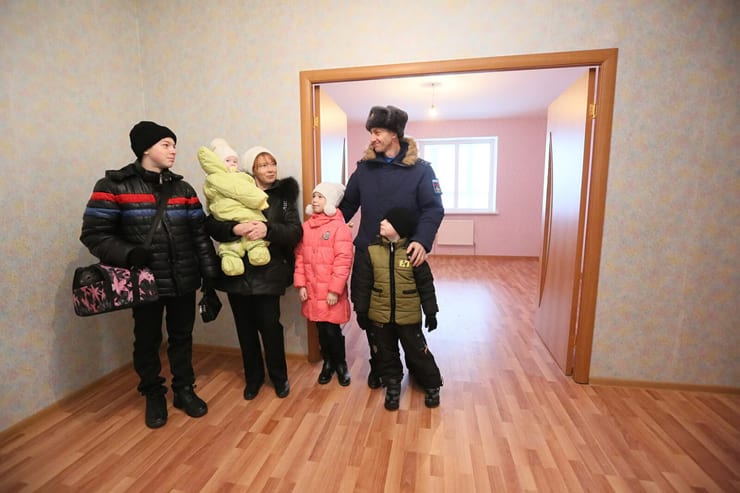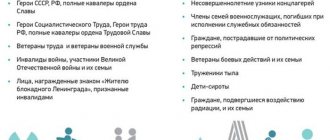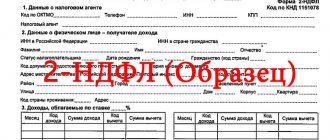Police work involves risks to health and life, and it also involves constant physical and emotional stress. The dedication of employees of the Ministry of Internal Affairs is compensated not only by wages, but also by a number of benefits that allow police officers to receive material and other benefits. The most significant benefits for employees are the provision of subsidies for the purchase of housing. For police officers, the issue of purchasing real estate is as pressing as for other categories of citizens. State programs allow employees of the Ministry of Internal Affairs to receive financial assistance to solve housing problems.
Legal basis
Legislative norms providing for the rights of employees of the Ministry of Internal Affairs to obtain housing are regulated by Federal Law No. 247-FZ “On social guarantees for employees of the Ministry of Internal Affairs of the Russian Federation...” adopted on July 19, 2011. This regulatory act explains on what basis official real estate is allocated to police officers for permanent residence. The principles of registration of a subsidy and its payment are documented in another legislative act - Decree of the Government of the Russian Federation No. 1223 “On the provision of a one-time social payment ... to employees of the Ministry of Internal Affairs of the Russian Federation” dated December 30, 2011.
These two legislative acts fully regulate the issue of providing state support to police officers. In addition to these, there is also a Housing program. It was developed back in 2002, but it is constantly being extended. According to Resolution No. 889 adopted on August 25, 2020, the federal state program was extended for 2018-2020.
Payments for housing to police officers in 2020 latest news
The 7 billion allocated this year made it possible to satisfy the needs of only those on the waiting list. This year, changes affected mainly the unified social payment. Now the budget allocation is 4.6 billion because the base funds increased by 2.6 billion. Employees of the Ministry of Internal Affairs will be able to receive a unified social payment for housing per year not only for some categories of children, but also for all relatives who live with them. The program for providing housing to employees of the Ministry of Internal Affairs began to gradually decrease during the year, because the financial situation in the country is difficult, and this can be judged at least by the increase in the retirement age.
Housing is provided to police officers in 2020 under certain conditions
But you can only save your queue when you retire by going to court. When making preliminary calculations, you need to take into account that the ERU does not have a specific amount. It is calculated based on length of service, there is a coefficient by which the total amount is multiplied when calculating, and after 20 years there are already restrictions.
There are established criteria for the need for housing - lack of ownership does not always guarantee recognition as needy. They also consider the real estate that is owned by family members, as well as the condition of existing housing.
Even greater difficulties may arise with the construction of a separate house. In this case, it is usually much more difficult to calculate a preliminary detailed estimate, and the deadlines for the report may be delayed. Based on this, a subsidy for building a house is usually approved and takes longer to receive.
This is interesting: 2020 water disposal management organization
Housing construction
Most often, employees choose the first option - it allows for significant savings, since the difference in the price of apartments in housing under construction and finished housing is quite large. Participation in such projects has its own risks, but the commission that monitors the use of targeted resources usually extremely scrupulously checks the future developer for integrity. If the contractor is classified as a non-trusted person, the application may be rejected. It is worth considering that buying an apartment in ready-made housing, which is already officially in use, takes place without such problems.
1. For employees of the Ministry of Internal Affairs (including former ones), another regulatory act is in force - the Federal Law “On social guarantees for employees of internal affairs bodies of the Russian Federation and amendments to certain legislative acts of the Russian Federation” dated July 19, 2011 N 247-FZ. It is he who determines the rights of such citizens related to service in the police department, including the right to housing. 2. Perhaps you are simply referring to the wrong law.
State housing certificate is a personal certificate certifying the right of its owner to receive a free subsidy for the purchase of housing. It is issued to employees of the Ministry of Internal Affairs as part of the implementation of the subprogram “Fulfillment of state obligations to provide housing to categories of citizens established by federal legislation.” It is part of the federal target program “Housing”. A one-time social payment is provided to an employee within the budget allocations provided for by the federal executive body in the field of internal affairs, another federal executive body in which employees serve, by decision of the head of the federal executive body in the field of internal affairs, the head of another federal executive body . The difference between them is in the order of receipt and the implementation mechanism.
Changing data
- do not have your own home;
- not act as a party to a social rental agreement and not be a family member of the tenant;
- to have in the family a patient with a severe form of a chronic disease, in which living together with him in the same housing (own, rented) becomes impossible. The exact list of such diseases is approved by the Government of the Russian Federation,
- live in premises that do not meet the requirements established for residential premises, regardless of the parameters of the occupied housing,
- live in a dormitory;
- live in a communal apartment;
- live in a room that is not isolated from other owners of the residential premises who are not family members, and also if their parents or adult children who have created their own family live together with police officers,
- live in rented or own housing, the area of which does not meet the standards (less than 15 sq.m. per 1 family member).
The Ministry of Internal Affairs of the Russian Federation must approve, within a 3-month period, the formation and maintenance of a database of persons registered to receive a one-time social payment for the purchase or construction of residential premises, as well as those removed from this registration.
Need for housing
Preferential subsidy programs for police officers imply that financial assistance will be provided only to those categories that do not have their own apartment or their living conditions need to be improved. It is not possible to receive government assistance if you have comfortable real estate.
The need for housing is determined by several criteria at once. Lack of home ownership does not always entail automatic recognition of a person as needy. When considering the situation, the real estate owned by his family members is also taken into account. But there are also the opposite situations, when there is housing, but it is not equipped or does not meet the area standards, then a citizen may be recognized as in need of improving existing conditions.
The main principle of the program is to improve the quality of life of a police officer. The more stable a person’s financial situation is, the better he works, without being distracted by external stimuli in the form of constant worries about the lack of his own living space. In addition, the opportunity to receive a housing subsidy attracts people to the authorities and increases the prestige of this profession.
Registration
To obtain the official status of a person in need, you need to make an important move - register. The queue of citizens in need is formed in two ways - at the national level, by region. Registration is carried out on the initiative of the policeman himself; if he does not take any steps, then the procedure will never begin.
You can receive an account number only if a person can prove that his situation fits the established criteria.
To do this, a package of documentation covering the situation from all sides is submitted along with the application. The Housing Commission considers each candidate separately and decides whether to accept him into the queue or deny him this privilege.
Registration of those in need is accompanied by the assignment of an individual registration number to the applicant. Receiving a subsidy is possible no earlier than the waiting list. Sometimes the wait lasts for years, so it is recommended to submit documentation as early as possible. Employees of the Ministry of Internal Affairs form their own queue of those in need, and are not assigned to the general federal or regional one. This increases the speed of progress in the queue.
One-time social payment
A one-time social payment for the purchase of real estate is a one-time assistance, which is expressed in the issuance of a certain amount of funds to an individual police officer. The money has a specific purpose and can be spent exclusively on purchasing housing. A one-time social payment allows you to:
- Buy ready-made living space on the primary or secondary real estate market.
- Build an apartment or house.

This type of government assistance is available to every employee of the Ministry of Internal Affairs who is in line for those in need. Every year, certain amounts of money are allocated from the federal budget to provide this type of assistance. Subsidies are provided on a first-come, first-served basis. But the queue itself is all-Russian for employees of the Ministry of Internal Affairs. Some police officers can expect to receive a subsidy fairly quickly, because there is a list of preferential categories that receive assistance out of turn.
For housing construction
Construction of housing involves the use of allocated funds in several directions. A police officer may:
- Conclude a share participation agreement in the construction of a residential multi-apartment building.
- Start building your own home.
Most often, citizens resort to using government assistance according to the first option. By concluding a DDU agreement, a person gets the opportunity to save a significant amount on the difference in cost between apartments under construction and secondary housing. Of course, such investments are associated with risks, but the commission that allocates a one-time social payment is interested in ensuring that the money does not go to waste, so it conducts a thorough check of the developer. But if you want to buy an unfinished property, you should be prepared for the fact that the application may be rejected if the developer is distrustful. But buying a ready-made apartment in a building that has been put into operation will not be difficult.
Construction of a private house is an even more risky project. It is quite problematic to calculate an exact estimate in advance. In addition, the deadlines for reporting on the targeted expenditure of allocated funds are being delayed.
Despite all the obstacles, a one-time subsidy can be spent on housing construction, but the recipient will have to go through a more complex and lengthy procedure for receiving it.
For the purchase of housing
Purchasing residential properties from the secondary market is the easiest option to spend the allocated funds in the right direction. This method of spending has many advantages both for the recipient of the subsidy and for government agencies that monitor its expenditure.
An employee of the Ministry of Internal Affairs who buys housing from the secondary market with allocated state assistance can:
- Select any object, regardless of its location, the main thing is that it is located in the specified locality and meets the stated minimum standards. The premises must meet sanitary standards, which means they must have proper water supply, gas supply, sewerage and electricity supply.
- Move into the purchased premises immediately after completing all relevant documentation.
In most cases, subsidies involve the purchase of apartments, but private houses can also be purchased, especially if we are talking about rural areas where there is no choice as such.
Categories of citizens
Employees of the Ministry of Internal Affairs can take part in the state preferential subsidy program if they have a documented need. The list of categories that can count on government assistance includes:
- Employees who are currently registered in the Ministry of Internal Affairs.
- Those transferred to the reserve due to retirement age or health conditions.
- Family members of those police officers who died in the performance of their professional duties.
A police officer, even if he meets the established requirements, has the right to make his own decision about his participation or non-participation in the preferential program. It should also be taken into account that participation in other social programs or receipt of housing subsidies by family members automatically excludes a police officer from the category of those in need.
Each category of needy people goes through several steps to receive a government subsidy. Some nuances of the procedure may also affect the speed of obtaining results in the form of the listed funds.

Those serving
Federal Law No. 247 indicates that any employee of the Ministry of Internal Affairs can count on receiving state assistance. Neither rank, nor salary, nor even length of service influence this process in any way. But some minimum criteria are still established. Only those employees of the Ministry of Internal Affairs who have worked in the authorities for at least 10 days can join the federal queue. This is considered a barrier to entry. Of course, it is impossible to receive a subsidy immediately after submitting an application for registration, so in the end the policeman will have to work for a single year before assistance is provided to him. It should also be taken into account that dismissal after a few months or years without good reason also deprives the citizen of the right to continue to apply for a financial subsidy.
Today, funds from the federal budget are allocated regularly, and the amounts of assistance, although small on a global scale, still allow the queue to move at a certain speed. Just a few years ago, it took decades to get your own home, but today you can purchase living space in a shorter period of time.
Those current employees of the Ministry of Internal Affairs who live in an apartment under a social rental agreement cannot count on government assistance. The same restriction applies to those whose contract is signed for one of their family members. If both spouses work in law enforcement agencies, then only one of them can receive a lump sum payment. It is recommended to apply for a subsidy to a family member who has extensive years of service in the police.
Retired
In Resolution No. 1223, the list of employees of the Ministry of Internal Affairs who can count on state payments gives a separate place to those who no longer serve in the police, but retain this right. These include:
- Dismissed due to length of service with accrual of pension benefits. Citizens who have served in the police for at least 12.5 years and have reached the specified age can become pensioners of the Ministry of Internal Affairs. Those who have previously registered as needy or have joined the queue after retiring can apply for housing.
- Those who completed service before the retirement period due to health reasons. Such categories may have a disability or transfer to work in an easier position outside the Ministry of Internal Affairs. It is important that information about transfer to the reserve due to injuries or injuries is documented.
- Those who left the service of their own free will before they retired, but have accumulated a minimum length of service, which allows them to count on receiving all the benefits they are entitled to. In this case, registration of those in need while still serving in the Ministry of Internal Affairs is considered a mandatory criterion.
Please note that being on the waiting list does not guarantee that you will receive a subsidy. All information about the absence of housing or its unsatisfactory condition is checked again immediately before receiving the subsidy.
If it is discovered that the property was purchased by the policeman himself or his relatives during the waiting period, then there will be no need to count on government assistance.
Families of deceased employees
A police officer who died in the line of duty is posthumously awarded, and members of his family receive government benefits, which also relate to the provision of real estate or improvement of living conditions.
The Family Code classifies the following persons as family members:
- The spouse of the deceased. Only official relationships that were in effect at the time of his death or that were terminated before his death are taken into account.
- Children of the deceased who have not reached the age of majority, as well as adults if they are disabled from childhood. Adult children under 24 years of age who are studying full-time at universities are also taken into account.
- Dependent relatives of the deceased. It is important that the fact of full support is proven and lasts for at least a year before the death of the policeman.
Relatives of the deceased can receive a preferential housing subsidy if he died due to:
- Serious illness leading to death.
- Received severe bodily injuries.
- Other injuries that led to death.
This category of beneficiaries must also prove their need. If there is real estate, then you should submit certificates stating that it does not meet sanitary standards or is insufficient according to square footage standards. State aid is also provided if the premises are recognized as unsafe and are being prepared for demolition.
Payments to employees of the Ministry of Internal Affairs for the purchase of housing in 2020
‒ employees, pensioners of the Ministry of Internal Affairs of Russia, registered as needing residential premises by the relevant territorial body of the federal executive body in the field of internal affairs, another federal executive body in which employees serve, before March 1, 2005, and living together with them members of their families at their request.
One-time social payment (UST) for police officers in 2020
If the applicant is not accepted for at least one of the reasons, he receives a refusal to be placed in the queue. Participation in the payment program is voluntary. Each employee who meets all the criteria has the right to independently decide whether to join the program or not. If a police officer falls under the preferential category of citizens, is registered in the queue to receive housing or payment for its purchase, then the right to participate in the program belongs to him not fixed.
This is interesting: Decoding kosgu 340 making braille signs for which sub-item to take into account kosgu 340 in the 2020 budget
In addition to the above, citizens working in law enforcement agencies have insurance guarantees. In the event of death while performing official duties, members of their families receive 3 million rubles, and can also enjoy benefits for travel, payment for housing and communal services, and medical care.
If you have been working in law enforcement for more than 10 years and do not have your own home, take advantage of the opportunity to receive one-time assistance. To do this, you need to submit a written application to the leadership of the federal authority in the field of internal affairs. In addition to the application, other documents will be required, a complete list of which is given in clause 5 of the Government of the Russian Federation No. 1223.
What support measures can a representative of the Ministry of Internal Affairs count on?
Dangerous and emotionally difficult service in the police has always been encouraged by the state. However, there is a tendency to cut benefits for employees of the Ministry of Internal Affairs. Let's consider what support measures police officers can take advantage of in 2020.
One of the types of subsidies created to improve the living conditions of police officers is the payment of unified social contributions to police officers per year. It applies to police officers who have served for at least 10 years and to those retired who need a better place to live. But if an employee in the Ministry of Internal Affairs, after dismissal, submits a report for financial assistance from the state, the commission will not satisfy such a request. This year, compensation will also be provided to pay for rented housing. To make one-time payments for housing to employees of the Ministry of Internal Affairs per year, 4 trillion rubles are allocated from the budget of the Russian Federation. Only those employees who meet the requirements of the title documents can count on them.
According to the Department of Logistics and Medical Support of the Ministry of Internal Affairs of the Russian Federation, ESV for police officers will be paid in the same amount per year, as reported in the latest news. Being a police officer comes with risks and many restrictions. It is obvious that it is the state that must take upon itself its full material support. In addition, as a civil servant, a police officer does not have the right to engage in commercial activities and earn extra money in his free time. Although the salary in the Ministry of Internal Affairs is higher than the national average, the high cost of real estate does not allow a quick solution to the housing problem.
ESV payments for housing to police officers in 2020
The media published the latest news about the procedure for obtaining or easing the housing situation for employees of the Ministry of Internal Affairs. The 7 billion allocated this year made it possible to satisfy the needs of only those on the waiting list. This year, changes affected mainly the unified social payment. Now the budget allocation is 4.6 billion because the base funds increased by 2.6 billion. Employees of the Ministry of Internal Affairs will be able to receive a unified social payment for housing per year not only for some categories of children, but also for all relatives who live with them. The program for providing housing to employees of the Ministry of Internal Affairs began to gradually decrease during the year, because the financial situation in the country is difficult, and this can be judged at least by the increase in the retirement age.
Terms of service
All specified categories of persons can receive a one-time cash payment, provided that they meet the established payment criteria. The subsidy is provided if:
- An employee of the Ministry of Internal Affairs or his family members are the direct tenants of a social housing facility, which in terms of area does not correspond to the number of residents. Living space standards vary by region. In most parts of the Russian Federation, a standard of 15 m2 per person has been adopted, but the exact figures should be clarified at the place of service.
- Non-compliance with area standards allows you to apply for assistance even if you have your own real estate.
- The residential premises completely or partially violate existing sanitary standards.
- One of the family members is sick with a serious contagious disease, which is included in the closed list of diseases. Living with such family members is considered dangerous.
- A police officer lives in a communal apartment or dormitory.
- An employee of the Ministry of Internal Affairs occupies a room, and the neighboring ones are given to other citizens who are not members of his family.
Living in a communal apartment, a dormitory and an adjacent room allows you to automatically be considered in need, regardless of the area per person.
Benefits for police officers in 2020
The media also reported that in 2020 the government plans to reform the Ministry of Internal Affairs. An increase in length of service in the Ministry of Internal Affairs is allowed. Officials prepared a bill, but the president did not approve it. Experts are confident that if this issue is ignored, the government will not be able to finance the department from the budget. Therefore, raising your seniority in 2020 becomes an absolute necessity.
Who gets the benefit?
Some benefits are also provided to widows of deceased employees until they get married. The bill adopted by the State Duma preserved the right of widows and children to use medical care and recreation in sanatoriums and dispensaries of the Ministry of Internal Affairs.
- Employees who have served in the police for at least 10 years, who live in a dormitory, communal apartment or in a room where non-family members live in direct contact with them, can register.
- Judging by the fact that 108 thousand people applied for a one-time social payment to improve housing conditions for employees of the Ministry of Internal Affairs, these are the conditions in which a person and his family live, who gave more than 10 years of their life to the Ministry of Internal Affairs. Because, according to the conditions, family members also should not have their own housing or even rent it under a social tenancy agreement.
- The only caveat in this case is if each family member in the rental housing has less than 15 square meters.
- If a room or apartment is in disrepair or is intended to be demolished, then the relevant authorities cannot refuse payment. But at the same time, it is clear that they will be in last position on the list of those in dire need.
- It is assumed that some new bodies will deal with the distribution of funds allocated from the budget. But neither the scope of their competence nor their legally defined status is known.
This is interesting: Where should the stamp be placed on the bill of lading?
In 2020, the unified social allowance for housing for employees of the Ministry of Internal Affairs will be less than in the previous year. In numbers this looks quite impressive. If previously almost 2 thousand employees could receive funds, then according to the latest news from legislators, in 2020 less than 500 people can count on such financial assistance. Although, according to some reports from informed sources, it is reported that the exact figure is not yet known, and perhaps it will be even less.
Requirements for an employee to receive payment
As for getting in line for housing for employees of the Ministry of Internal Affairs, after the decision is made to replace the categories of beneficiaries with those who are eligible to receive assistance, there is practically no chance anymore.
The allocated funds are enough for one person. There is no definite information about what amounts are planned, we only know that they are being cut annually. The changes made to the law specifically reduced the number of categories of beneficiaries who are entitled to one-time payments. As for getting in line for housing for employees of the Ministry of Internal Affairs, after the decision is made to replace the categories of beneficiaries with those who are eligible to receive assistance, there is practically no chance anymore.
Required documents
Receiving a one-time payment is possible if you provide a comprehensive package of documents that can justify the need for this assistance. It includes:
- Application for financial state assistance. It is filled out according to the developed form.
- Police ID.
- Passports of family members and birth certificates for children.
- Certificate of marriage or divorce.
- Prenuptial agreement, if any.
- An extract from the personal account of the apartment where the employee lives today.
- Extract from the house register.
- Documented living conditions.
- Certificates from educational institutions stating that children under 24 years of age are studying full-time at a specialized secondary or higher educational institution.
- Certificate of length of service of a police officer.
- Papers confirming the absence of real estate owned by an employee of the Ministry of Internal Affairs and his family members. This could be certificates from Rosreestr, technical inventory bureau, etc.
- If you have the right to additional living space, a certificate confirming this fact.
- Pension certificate for those retired due to age.
- Forms for awarding awards and titles.
- Death certificate of an employee of the Ministry of Internal Affairs, if his relatives apply.

All documents are submitted in photocopied form. If they are supported by originals, then they do not need to be certified, otherwise each document must be certified for authenticity by a notary.
Providing official housing
Article 8 of Federal Law No. 247-FZ establishes the right of an employee of the Ministry of Internal Affairs to receive official housing. This privilege applies to those police officers who do not have their own apartment in the region where their duty station is located.
Service housing refers to specialized premises where you can live on a permanent basis. These could be houses, apartments, dorm rooms or communal apartments.
Conditions
Employees who meet the following conditions can receive official housing:
- They do not have a signed rental agreement for social housing.
- They do not own real estate in this region.
- They live in social housing or in their own apartment, but cannot return there every day after work due to the remoteness of their location.
All of these conditions apply equally to both the police officer himself and his family members.
Which police officers have the right to receive housing under a social tenancy agreement?
According to Article 6 of the Federal Law of July 19, 2011 N 247-FZ “On social guarantees for employees of internal affairs bodies of the Russian Federation and amendments to certain legislative acts of the Russian Federation” (as amended on November 30, 2011), employees, citizens of the Russian Federation, dismissed from service in the internal affairs bodies and registered as those in need of residential premises by the relevant territorial body of the federal executive body in the field of internal affairs, another federal executive body in which employees serve, before March 1, 2005, and living together with by them, members of their families are provided with residential premises of the housing stock of the Russian Federation by the specified federal body under a social tenancy agreement with the subsequent transfer of these premises into municipal ownership.
Thus, as follows from the above rule of law, the following can apply for residential premises under a social tenancy agreement:
- only employees or citizens dismissed from service in internal affairs bodies;
- employees of internal affairs bodies, citizens registered as needing residential premises by the relevant territorial body of the federal executive body in the field of internal affairs, or another federal executive body in which employees serve, before March 1, 2005.
That is, employees who have not yet been dismissed from service cannot, by law, apply for the provision of residential premises under a social tenancy agreement. The legislator proceeded from the fact that their right to residential premises is realized by providing them with official residential premises or by paying employees of the internal affairs bodies monetary compensation for renting (subletting) residential premises. And under a social tenancy agreement, an employee can only be provided with housing on a general basis, like all other citizens of the state who need housing.
Part 1 of Article 6 of Law No. 247-FZ dated July 19, 2011 is based on Part 2 of Article 6 of Federal Law No. 189-FZ dated December 29, 2004 “On the entry into force of the Housing Code of the Russian Federation,” according to which “citizens registered before On March 1, 2005, in order to subsequently provide them with residential premises under social tenancy agreements, they retain the right to be on this account until they receive residential premises under social tenancy agreements. These citizens are removed from this register on the grounds provided for in paragraphs 1, 3 - 6 of part 1 of Article 56 of the Housing Code of the Russian Federation, as well as in the event that they lose the grounds that, before the entry into force of the Housing Code of the Russian Federation, gave them the right to receive residential premises under social rental agreements. These citizens are provided with residential premises under social tenancy agreements in the manner prescribed by the Housing Code of the Russian Federation, taking into account the provisions of this part.







